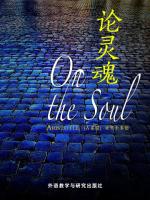On the Soul
"On the soul" in 3 volumes. In the first volume, Aristotle discussed the status of the theory of the soul and research methods, as well as previous studies about the soul of several claims, has a very important historical value. In the first 3 chapters of the second volume, Aristotle discusses the definition of the soul, that the soul is the form, the body is the material; the soul is the cause of the body, is an entity; the soul includes 3 parts of the function of reason, feeling and nutrition. In the last 9 chapters, he focuses on the problem of feeling, which is the essence of the book. In the history of ancient Greek philosophy, Aristotle first clearly put forward five kinds of feeling. He believes that the object of perception is a different, external, visual object is color; hearing object is sound, sound is caused by the collision of objects; taste is itself a result of the role of the thing; tactile object is the nature of the element, that is, hot and cold and dry. He also believes that the feeling of the generation must be through some intermediary, such as visual color is the color through the transparent body of light generated by the eyes; hearing is the sound through the water or air and other media to the ear, causing ear indoor air activity generated. According to the medical and anatomical knowledge of the time, he asserted that the structure of each of the senses is adapted to their object. He sure felt depends on the visual senses: bad eyes stopped, the eardrum is broken, there is no sense of hearing. He summarizes the common points of the five senses that the sensory acceptance of is a form of things and not material, the human mind is like wax block, the feeling is the imprint of the wax leave things in. This is the ancient Greek materialism feeling on the highest achievement, Empedocles "flush with the channel", Democritus's "theory of image" precision much more. On the third volume of the soul is to explore the rational soul and rational understanding of the problem. He explored the difference between reason and feeling, the function of thinking, the task of rational cognition, etc.. These thoughts although there are a lot of idealism, but later on the development of epistemology has a positive effect.



 京公网安备 11010802032529号
京公网安备 11010802032529号